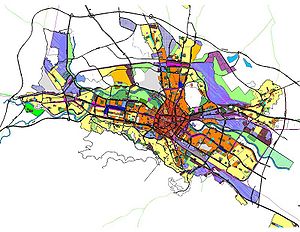Welcome to NexHaven – your go-to resource for all things real estate in Cameroon. Today, we’re diving into a crucial aspect of property ownership and development (zoning). Understanding zoning regulations is essential for anyone looking to buy, sell, or develop a property in Cameroon. Let’s explore what zoning is, why it matters, and how it impacts real estate decisions.
What is Zoning?
Zoning refers to the process of dividing land into sections called “zones,” each of which has specific regulations governing its use. These regulations control how land can be used and developed, ensuring orderly growth and development within a city or region. Zoning laws typically specify what types of buildings can be constructed, their size, height, and how they can be used.
The Importance of Zoning in Cameroon
Orderly Development:
Zoning helps to ensure that land is used efficiently and that developments are planned in a way that benefits the community. This prevents conflicts between incompatible land uses, such as industrial facilities near residential areas.
Property Value Protection:
Proper zoning regulations protect property values by preventing incompatible land uses that could negatively impact the desirability of an area. For example, residential zones are kept separate from noisy industrial zones.
Environmental Protection:
Zoning laws often include provisions to protect natural resources and promote sustainable development. This can include restrictions on building in flood prone areas or requirements for green spaces.
Zoning Categories in Cameroon
In Cameroon, zoning categories generally fall into several broad categories:
Residential Zones (R):
These areas are designated for housing. They include single family homes, multi-family units, and apartment buildings. Regulations in these zones control the density and type of residential developments allowed.
Commercial Zones (C):
These zones are intended for businesses, retail establishments, and offices. They regulate the types of commercial activities that can take place, ensuring they are suitable for the area and won’t disrupt nearby residential zones.
Industrial Zones (I):
Industrial zones are designated for manufacturing, warehousing, and other industrial activities. These areas are typically located away from residential zones to minimize noise and pollution impacts.
Agricultural Zones (A):
Agricultural zoning preserves land for farming and related activities. These zones often have restrictions on the types of buildings and developments that can occur to protect farmland from urban sprawl.
Mixed Use Zones (MU):
Mixed use zoning allows for a combination of residential, commercial, and sometimes industrial uses within a single area. This type of zoning promotes vibrant, walkable communities where people can live, work, and shop.
Navigating Zoning Regulations in Cameroon
Research Local Zoning Laws:
Before purchasing or developing property, research the local zoning laws in the area. Each city or region in Cameroon may have different zoning regulations. Check with the local municipal office or planning department for detailed information.
Consult with Professionals:
Engage with real estate professionals, such as real estate agents, lawyers, and planners who are familiar with local zoning laws. They can provide valuable insights and help navigate the complexities of zoning regulations.
Consider Zoning When Buying Property:
When searching for property, always consider the zoning of the area. Ensure that the property’s zoning aligns with your intended use. For example, if you plan to open a business, make sure the property is in a commercial zone.
Stay Informed About Zoning Changes:
Zoning laws can change, impacting the value and permissible uses of your property. Stay informed about any proposed changes to zoning regulations in your area by attending local government meetings or subscribing to municipal newsletters.
Challenges and Opportunities
Understanding zoning laws in Cameroon can present both challenges and opportunities:
Challenges:
Navigating the complexities of zoning regulations can be daunting, especially for new investors. Misunderstanding zoning rules can lead to costly mistakes.
Opportunities:
Properly leveraging zoning laws can enhance property values and open up development opportunities. For instance, purchasing land in an area poised for rezoning to a higher density use can be a lucrative investment.
Conclusion
Zoning is a fundamental aspect of real estate that ensures sustainable and orderly development. By understanding and adhering to zoning regulations, property owners and investors can make informed decisions that protect and enhance their investments. At NexHaven, we’re committed to providing you with the knowledge and resources you need to confidently navigate the real estate landscape in Cameroon.
We want to hear from you what topics would you like us to cover in our future blog post?
Your suggestions are invaluable in helping us create content that meets your needs in the comment section below.
Stay tuned for more insights and updates from nexhaven. Whether you’re buying, selling or developing property, we’re here to guide you every step of the way.
For more information on zoning and other real estate topics, visit our website or contact our team of experts.
Stay tuned for more insights and updates from NexHaven. Whether you’re buying, selling, or developing property, we’re here to guide you every step of the way.



